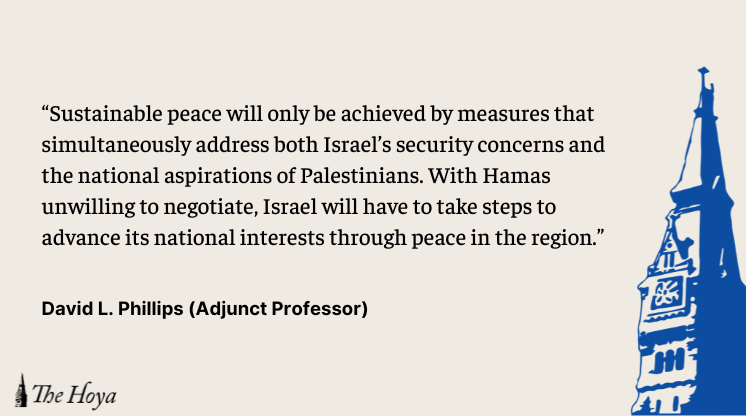Initial shock over Hamas’ attack of Israel is turning to rage. Israelis are horrified by the Hamas killing spree, with many, including Defense Minister Yoav Gallant, clamoring for a ground invasion to drive Hamas out of Gaza.
Columns of tanks and other reinforcements are already mobilizing for a ground invasion to end the threat posed by Hamas once and for all.
The scope and scale of Hamas terror is staggering. Its actions are heinous and despicable. Since Oct. 6, 1,200 Israelis have perished, including the elderly, mothers and children. More than 2,800 have been injured. The casualty count is growing hourly.
In addition, Hamas militants have taken more than 150 hostages. The terrorist attacks are extremely personal for Israelis.
Israel understandably wants revenge for the savage murder of its citizens. However, an invasion of Gaza by the Israeli Defense Forces will not increase Israel’s security and will not stabilize relations with Palestine.
Attacking Gaza may provide immediate gratification, but it will not address the root causes of this conflict: the humiliation and anger Palestinians feel over Israeli involvement in Gaza.
Escalation would be a disaster. Hostages would be killed, and thousands of Israeli soldiers and Palestinian civilians would likely die. It would also radicalize the region, motivating Hezbollah — an extremist Lebanese political party and militant group — to launch its rockets toward Israel. Iran, which sponsors Hamas and Hezbollah, could also increase its involvement in the region. An Israeli invasion of Gaza would also alienate Israeli Arabs, who comprise 20% of Israel’s population.
It cannot be questioned that Israel has the absolute right to defend itself. However, a ground invasion of Gaza would only result in more casualties. Hamas would like nothing more than to see a ground war that unifies the Arab world behind its cause.
Instead of escalation, a comprehensive solution is needed for both Israel and Palestine.
Sustainable peace will only be achieved by measures that simultaneously address both Israel’s security concerns and the national aspirations of Palestinians. With Hamas unwilling to negotiate, Israel will have to take steps to advance its national interests through peace in the region.
Israel should consider recognizing a Palestinian state. This would entail Israel’s disassociation from Gaza by limiting contact and cooperation.
Any possibility of recognition would require a significant, coordinated campaign to convince the Israeli people that this is the best course to ensure a secure and enduring Jewish state. Hamas has attacked Israel six times in recent years. As a result, Israelis have unsurprisingly and justifiably lost faith in the goal of peace with Palestinians.
Cooperation would not be one-sided. Palestinian leadership would have to abandon its calls for a boycott, divestment and sanction of Israel by the international community. In turn, international donors would provide resources for the reconstruction of Gaza and support for the Palestinian people.
A major impediment to cooperation is the ongoing hostage crisis. This is a deeply emotional issue for many Israelis.
Israeli hostages held by Hamas could be handed over to the International Red Crescent — an international humanitarian assistance organization — in exchange for the release of Palestinian prisoners. Qatar is already in the process of mediating this hostage and prisoner exchange.
The United Nations (U.N.) Relief and Works Agency should also continue to provide assistance to Palestinian refugees. Hamas would be encouraged to join a U.N.-led program of disarmament, demobilization and reintegration of militants into civilian life.
Regional actors must also assist in peace building. Saudi Arabia and Israel should normalize relations and work together to further extend the Abraham Accords. In addition, the League of Arab States can diplomatically work to secure recognition of Palestine by the U.N.
Israel was born out of the Holocaust in 1948, following the murder of six million Jews. The memory of millions lost can best be honored through peace in the region.
David Phillips is an adjunct professor at Georgetown University’s Securities Studies Program, specializing in conflict resolution and mediation. He has an attachment at Oxford University beginning in January 2024














